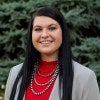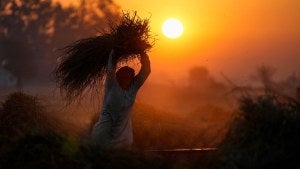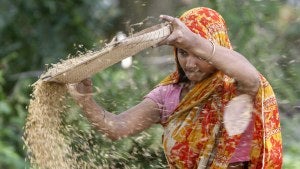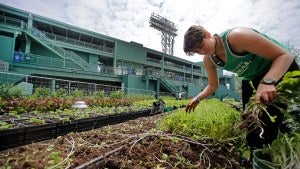Revolutionizing Agriculture through Youth Engagement
 Play Podcast
Play Podcast
About the Episode
The global food system is facing challenges like never before. Hunger is on the rise, food inflation has seen historic highs, and climate change is destroying harvests and reducing outputs. However, despite its seemingly dire state, the food system can and will meet our needs through deliberate advances in technology and biodiverse, nutritionally dense food. In this episode of Youth in Agriculture: Transforming Local Food Systems, Kelli Wicks and Alesha (Black) Miller discuss various challenges facing food and agriculture, and the different ways youth engagement can revolutionize the system to meet future needs.
[Intro music.
Natalie Burdsall: INTRO: Hello and welcome to the limited podcast series “Youth in Agriculture: Transforming Local Food Systems,” produced by the Chicago Council on Global Affair’s Center on Global Food and Agriculture. Today, we will be listening in on a conversation between Kelli Wicks, a graduate student and Manager of International Market Development at the National Pork Board, and Alesha (Black) Miller, the Chief Strategy Officer at Digital Green.]
Kelli Wicks: So, I'm originally from Iowa and I got my undergraduate degree, Iowa State University, in agriculture and society and international ag. And I am currently working on my master’s degree at Oklahoma State University, and I'm working on international agriculture with a focus on trade. And I'm also the Manager of International Market Development at the National Pork Board. I just started that in January, so working on finishing my master’s while working on... working on a full time job. So, it's exciting, and I'm glad to be in the agriculture and food space.
Alesha (Black) Miller: Awesome. And now I have to play the Iowa game because I'm from Iowa. So where are you from in Iowa?
Kelli Wicks: Oh, yeah. My parents live in Hubbard, so just north of Ames. Not too far.
Alesha (Black) Miller: Nice. Okay. My parents are high school sweethearts from Northwood.
Kelli Wicks: Okay.
Alesha (Black) Miller: So, like, I-35 when you're heading up to Minneapolis. But then I grew up in Centerville, like down south, and I left when I was about 14. So, yeah. Still have a lot of family back there. That's fun.
Kelli Wicks: Yeah.
Alesha (Black) Miller: Yeah. And did you say that you're already full time with the Pork Board and then you're finishing your masters, like I assume maybe in May?
Kelli Wicks: Yep. So I interned with the National Pork Board all last year from May to December, and I will be done in May, moving back to Iowa. So.
Alesha (Black) Miller: Okay, cool. So, I'm from Iowa. I lived there until I was about 14 and then moved to Arizona. I did an undergrad in journalism and psychology. You can see I was not planning to work on ag necessarily. And then I did a master’s degree in international relations. And after my master’s degree, I got a job working with my favorite professor, which was Catherine Bertini, who's a Distinguished Fellow at the Chicago Council. And I got a job working with her at the Bill & Melinda Gates Foundation in the Agricultural Development Program, doing a range of things as Research Analyst. I ended up spending about 8 years there. And then left and went to the Chicago Council. And I was at the Council for about four years. And then after leaving the Council, I consulted for a little bit and then ended up at Digital Green, which is an international, sort of tech-driven NGO that works with smallholder farmers and really equips them with technology to enable all kinds of... kinds of prosperity and opportunity. And I live in Kansas because my husband's a Kansan and his family still lives on the family farm. And we decided to move back to Kansas in the middle of the pandemic. And, so, I work remotely from here, and he works in agriculture too, so we're just a big aggie family.
Kelli Wicks: That's awesome.
Alesha (Black) Miller: Okay, well, I'm happy to start and ask the first question. And you want to just go back and forth, Kelly.
Kelli Wicks: Yeah, that works.
Alesha (Black) Miller: Cool. So, Roger Thurow, who's one of the Senior Fellows at the Council, always talks about being outraged and inspired. And I'm curious if you can talk about, like, when you think about working in food and agriculture, is there something that, like, gets you agitated in a way that it makes you want to fix things—like, outraged? And then is there something that inspires you to believe that change is possible or that you can contribute to that change? If you can think of like issues or moments that kind of fit into that, I'd love to know.
Kelli Wicks: I think a big one for me is... so I grew up in livestock, I've been raised in livestock, and one of the biggest things that's become a big attribute or big topic of conversation lately has been removing meat from diets. And I understand reductions and climate change are very important issues to address. But I believe the direction that livestock chains are moving are making progress and moving towards a more sustainable areas. And, so, one of the biggest concerns that has always been kind of on my radar and it's kind of being a focus of my thesis project is looking at animal sourced foods as an addition to sustainable diets. For example, in the Philippines, one in five children are stunted, which is a significant amount. And a lot of the reason is because they're not receiving the essential amino acids that they need to grow and develop, and they have high... very, very high tariffs on animal sourced foods such as pork or other products. And so that kind of creates a barrier in a nutritional standpoint for those children. And, so, I think it's one of those things that I really wish we could have more narrative around the nutritional aspects of animal sourced foods in a diet to have those essential amino acids because that means so much to our bodies and growth and development.
And so that's one thing that definitely kind of gives me that a little bit of outrage, but as far as inspiration... I've been blessed to work with people from all over the world and I get really excited when they get excited about where they are at, where they see improvements... especially within the agricultural space in the livestock area. I just got back from Singapore and Thailand and Mexico, all back-to-back, so really getting to work with professionals from those different areas. It's really exciting to see their outlook on agriculture and see the excitement that they have for growing products for their area, but also working with the United States and working with different countries to really improve upon where they're at and where they want to go. And, so, that's something that really inspires me, and seeing those people get excited.
Alesha (Black) Miller: Nice. Can I ask you a follow-up question before you come to me, just before I forget?
Kelli Wicks: Yeah. Yeah.
Alesha (Black) Miller: Which is, you mentioned climate change and you mentioned this sort of push to reduce meat consumption and that the animal source food industry is getting more sustainable. Since you're someone who's close to the animal ag industry and you've studied extensively, what are some of the innovations that you think are really helping to make animal source foods more sustainable? What are breakthroughs or changes in practices that have you excited?
Kelli Wicks: Yeah, absolutely. So, I think kind of the big way that I've seen livestock industries move is, one, they're looking at how housing systems work with our management. So, they're looking a lot of like... how can we make barns or make spaces as efficient and as... just proper and, like, fit in with the environment without having those significant harmfuls that may have happened in the past. Another big innovation that I know, specifically, the pork industry is really looking at is their feed sources. That provides... that contributes a large portion to climate change. And, so, we're looking at different innovations within that space on how to reduce that within the feed. And that's all over the globe, that feed is one of the contributors. And, so, looking at ways to innovate and combat that is definitely an innovation that's in the works.
Alesha (Black) Miller: Thank you.
Kelli Wicks: So, I'm always interested in a lot of how people get into these spaces, and you didn't come from a traditional agriculture background. So, I'm interested how you got into food and ag space, and what kind of impacts have you been able to see through your roles?
Alesha (Black) Miller: Yeah, so I'm kind of a little bit traditional and a little bit not. So, my grandparents on both sides were lifetime farmers. I still have an uncle who's a farmer, and I grew up on a farm, but it was more what my dad would have called a hobby farm. Like, it was not our main source of income. My dad was a pharmacist. And I lived in a rural area and honestly never intended to work in agriculture. And I think my story is one that is probably relevant to this discussion of engaging youth, because I remember thinking as a young person that the... my goal, weirdly, was to escape rural life, even though I really liked my rural childhood. But it felt like there was more veneration of people who left than people who stayed, if that makes sense. And, so, when I moved... I moved to Phoenix when I was 14. I ended up, you know, being in a big city pretty far from agriculture and I got really interested in college in... I would say human rights issues, different kinds of human rights issues. I was particularly interested in displacement—refugee situations and emergencies that displaced large numbers of people which were happening at that time. And, so, I decided to pursue a masters working on international relations with the intention to work on displacement, on internal displacement, on cross-border displacement. And just had a passion for that. And, you know, you learn a lot in grad school. You get to learn about a lot of different topics. And that's where I interacted with Catherine Bertini. She has an extensive background in agriculture and food and food security. And I was just really inspired by her leadership and exposed to a lot of different ideas about why migration even happens, you know, and a lot of that is when your livelihood situation is untenable, migration is more likely to occur. When you face disaster after disaster, it's more likely to occur. And, so, I ended up getting this opportunity to go to the Gates Foundation, working with her. And I remember when I got the job, I thought, agricultural development. Okay, well, I'll go learn about that for a little while, and then maybe I'll find my way back to some of these issues that I spent more time thinking about, which included displacement, you know, refugee status and that kind of thing. And within a week, maybe, of being in the job, I was like, “Oh. Root cause of displacement, economic opportunity and like also you know, 40 percent of the world's population in some way depends on the food or food and agriculture system for employment and livelihoods.” This is a core story for how you address, you know, displacement and people not having livelihoods. And so that became clear.
And then I also within that same early stage was able to do some personal reflection and think about the fact that my dad's parents, for example, my grandmother finished seventh grade, my grandfather finished fourth grade, and my dad was the first in his family to go to college. And he was able to go to college because my grandparents were good farmers and because they seized a lot of opportunity that happened during their lifetime. You know, they got married in the 30s and a lot of the ag innovations that the US has now were coming online at the turn of the century. And, so, I realized that my own story, that my family story was deeply tied to agricultural development and that the opportunities that I had come from there. And, so, it's now a very personal... it has been for a long time, a very personal thing. And also one where when I meet young people anywhere that I am in rural areas and here, you know, here, their family members, for instance, like their parents, talk about wanting their children to escape agriculture because they see agriculture as too risky or too difficult. I had a mild version of that same feeling growing up and can understand how rural communities would feel that way and what needs to change to make it more attractive. So, that's my background.
Kelli Wicks: I'm kind of curious, kind of... how have your roles gone on to... what are some of the specifics that got on to impact... or different impacts you've been able to see throughout your career?
Alesha (Black) Miller: Yeah. I feel like I've been really fortunate to see a lot of really exciting things happen. So, during my eight years at the Gates Foundation, I got to work on grant making to support organizations globally that were working with smallholder farmers and I saw, you know, change is possible. You can see results. And I'm thinking of... I worked on one project with an NGO called Farm Concern International where we worked on domestic horticulture production, and this was in four countries in East Africa. And there were just humongous income gains from working with producers to align the types of production that they were producing, like the varieties themselves, with the market demand. So, for example, something simple that's stuck with me... farmers were producing red onion, for example, and what they were finding was that in the market, in the like main urban market, the sellers were saying, “We're getting a lot of onions that are too large and actually people want to buy an onion that's basically for a dish.” Like, “I want to buy this onion and I want to use it right away in a particular dish. I don't want to pay for a larger onion that I'm not going to use fully in that recipe.” So, they were looking for a particular sized onion, and the variety that farmers were growing were larger and they had no way of knowing that there was this very specific preference. And once they switched, it unlocked a lot more sales opportunities, right? And with such a clear option to address that. Similarly, with potatoes, making sure that the variety of potatoes was fit for the purpose that it was... some potatoes are meant for potato crisps and others are meant for boiling, right? And that project, a lot of that was market alignment and then also bundling or integrating services at the village level so that farmers had access to finance, but also had access to improved inputs, had ability to kind of like think about integrated production at the village level so that aggregation was more seamless. And that's just one example.
But, like, I feel like there were huge income gains—doubling and, in some cases, tripling of incomes over the course of that project that came from both increasing production but also aligning better to the market. So, I have lots of projects that I've seen honestly, kind of... like, that where within a very short amount of time you can see change, and vegetables in particular because you can get four and five seasons, in some cases in a year, if you can change practices there you can really see a lot of change.
But the other things that come to mind, more to systemic level, and then I'll speed up. But you know I'm thinking of the African women in agricultural research for development program, which is hosted by ICRAF, one of the CG centers. They've been around for, I would say, 15, maybe 17 years now. I'd have to look at their exact length of time. But the issue that they were addressing was that we had poor representation of women in agricultural research institutions and when so much of the research institutions work is doing participatory research, there was a real barrier between male researchers actually soliciting input from women. And, so, their mission was to increase women's representation in those institutions. And what they realized was it wasn't a matter of education. Actually, women were completing degrees at similar rates as men, but they were dropping out of the workforce. And they were dropping out of the workforce due to a number of issues at the bachelors, masters, and Ph.D. level. And, so, the award program provides both mentorship but also training and addresses some of the core institutional challenges that make it harder for women to continue careers in agriculture. And people should go check out their results. But in the course of their history, they've really shifted the representation of women across African research institutions, and that inspires me a great deal. And then the last thing I'll say, you know, I'm inspired by my current work, which I could talk endlessly about, but also at the Chicago Council. There was the passage of the Global Food Security Act, and that was a really inspiring commitment to see that, that there's bipartisan commitment to global food security and that it's been sustained across multiple changes in administrations. And, so, I'm inspired to be able to see that kind of long term committed too.
Kelli Wicks: Yeah. No, that's great. And I hadn't heard about some of those initiatives. So, we're really excited to keep looking into more of this.
Alesha (Black) Miller: Yeah, there's so many good examples, so many. And, actually, for those who are really curious, there's an older document... there was a study done by IFPRI—it's now probably five or seven years old—called Millions Fed where they actually documented proven solutions in agricultural development. And what you see is a lot of these initiatives take a while, you know, they take five or 10 years to really show the large-scale change and so for those who want to see that change is possible in a rigorous way, I’d recommend Millions Fed. It's a good primer.
So, Kelli, tell me what you... so you're from Iowa, you're going to be moving back. I imagine you might stay connected to young people in your area. What will you, kind of, say to young people, or what would you say to young people who are considering their career choices? Why... why would agriculture be a meaningful choice? Why do you think it deserves more engagement and attention?
Kelli Wicks: Yeah, so I'll talk about, like, my own experience coming up through... getting involved in this space. In high school, I had a history project I needed to do, and I discovered Norman Borlaug. I was so inspired by his story and his work and then, with the World Food Prize Foundation and to see his work continue, and I feel like that opportunity allowed me to propel me further into my career. And, so, when I talk to other people, younger or maybe around my age, and we talk about careers, I always have seen agriculture such a fruitful career because it touches just about anything and everything, no matter what area you're thinking. And because we rely on it for food, for energy, for a variety of things, it's one of those areas that I foresee living longer than, say, a startup area that may not see the end or may not make it all the way through. And, so, because of its longevity, it's always been a reliable place and you can change and you can mold and... but it also provides a lot of growth opportunity for conversations like this, being able to work with a professional like you, I think is really inspiring and a really unique opportunity to continue that education, whether it's for me who wants to go work in trade or if it's one of my best friends who's working on her veterinarian degree. I think it's really a cool opportunity and it's a space that we can continue growing, no matter what you want to work with, whether it's the animals, the people, crops... I just think it offers so many facets and it's something I always talked to people about, or even if they want to be in policy, like there's opportunity for that. So, I just really appreciate the breadth and depth that it offers.
Alesha (Black) Miller: Absolutely, yeah, there's no way we can do without food or agriculture. It will not... it will never be passe.
Kelli Wicks: Yeah, it will... it will be there, yeah. So, a big one and... looking forward from your viewpoint, your experiences, how do you foresee the future of agriculture, say within the next 10 plus years?
Alesha (Black) Miller: Well, so, I think probably everybody has heard this, but I truly believe this and our organization is living it every day, which is that the next sort of revolution in agriculture will be digital. And we're seeing it already. And I work for an organization called Digital Green. So, obviously a core part of what we believe is that, you know, farmers with the right access to technology and capacity strengthening and finance, you know there's a lot of things here, but technology has the ability to solve some problems that farmers have been facing for a long time and in a faster way. And, so, we've seen that in our work over the last 15 years. We've used a very basic technology, which is video, to produce community videos by and for farmers demonstrating best practices in local languages and been able to screen those videos in regular kind of meeting groups with great effect, with high rates of adoption with increases in income. We've seen up to 17 percent increases in income and we've now, within the last couple of weeks, actually crossed the threshold to Digital Green reaching over four million farmers. So, we've been able to see a lot of great effects from that very basic technology.
But you now have growing numbers of farmers with a mobile phone in their hand, with a smartphone in their hand, a connection to the internet. And they're already using it in ways that solve problems. I mean, the ways that WhatsApp is being used to solve agricultural supply chain problems is astounding. You know, the coordination challenges that farmers have to overcome to aggregate... to buy inputs together or to aggregate to sell together or to negotiate prices is something that just basic communication technology can do a lot to solve. So, I think digital technology is going to be a really primary tool for farmers to use. But I don't think digital technology is sufficient and I don't either think that it's neutral, meaning I think we have to be careful that we... that we think about how to protect farmers. Their rights, basically, and make sure that the way that we develop digital technology and data ecosystems for agriculture continue to put farmers at the center of that and put them in a position of power where they can negotiate. And where this new asset, their data about what they produce and how they're producing it, is something that they can use to their benefit. And so that's something that I think we'll have to be very vigilant about. How do we develop digital ecosystems for agriculture in a way that's equitable?
And I also think that, you know, we personally at Digital Green believe that farmers organizations have a really important role to play in that equitable and sort of farmer-driven digital transformation because data is inherently more valuable when it's aggregated. And, so, just like from organizations have helped farmers to aggregate for sales or aggregate for inputs, they also are important for aggregating for data and helping farmers use that data to negotiate in the marketplace. So, we'll be working on a lot of innovations that help farmer organizations be more efficient and use digital technology while continuing to kind of advance digital agricultural extension and advocating for equitable kind of digital ecosystems. So, I think that that's a big transformation that will just continue in the next 10 years. And I'm excited to see where we are and how farmers continue to kind of, like, use the tools that are at their disposal, which includes digital, but other kinds of advancements. Because they are just incredibly creative people, right, who have to balance so many different needs and risks. So, that would be something I'm excited about. And then continuing to see us use all kinds of technologies and knowledge at our disposal to get more climate resilient. There are so many innovations coming out and we have to keep pace with the shocks that are coming at farmers in order to feed ourselves and for everyone to have the food and nutrition security they need and similarly how we can continue to grow more nutritious food systems because as you said, this is core for so many people around the world. We still have unacceptably high rates of child stunting and other forms of undernutrition. And I think that our food system can and will meet those needs, but it's going to have to be deliberate, so continuing to pay attention to how we create biodiverse nutritionally dense food systems and use the best of our knowledge to kind of keep advancing those along with digital technology, that's what I get excited about. I think things are going to... things will look different in 10 more years as they have every decade and I'm so excited they're people like you coming up to kind of work on that and bring new vision to the space.
Kelli Wicks: Yeah. Well, that's really exciting and I kind of... as you're talking, I was kind of thinking of the way we talk about it, especially at the National Pork Board, is we're very science driven and so... science-based and results driven. And I think that kind of sums up where agriculture is headed and I think that's really kind of exciting and we like to be focused on our farmers, but we're also very focused on the consumers of products because our farmers are also the consumers.
Alesha (Black) Miller: Absolutely. It takes both, right, we're going to have to balance the... there are fewer and fewer people producing food and so it has to be a negotiation between what the consumers need and want and what the farmers need and in order sustain their businesses and sustain the land that they're on.
Natalie Burdsall: I want to thank you both, Kelli and Alesha, for providing your thoughts and insights on youth engagement in global food and agriculture.
[Natalie Burdsall: OUTRO: And thank you for tuning in for this episode of “Youth in Agriculture: Transforming Local Food Systems.” As a reminder, the opinions you heard belong to the people who express them, and not the Chicago Council on Global Affairs. This episode is produced and edited by me, Natalie Burdsall. Thank you for listening—we’ll see you again next week.
Outro music.]






Other Episodes
 Food and Agriculture
Food and Agriculture
How do we nourish the population, while protecting the planet from the very act of nourishing us?
 Food and Agriculture
Food and Agriculture
The future of agricultural innovation is dependent on young people. How can we motivate them to get engaged?
 Food and Agriculture
Food and Agriculture
The Youth in Agriculture podcast examines new innovations required to improve the food system.
